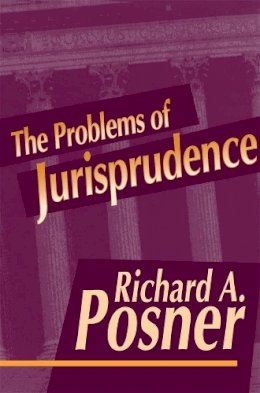17%OFF
Stock image for illustration purposes only - book cover, edition or condition may vary.
The Problems of Jurisprudence
Richard A. Posner
FREE Delivery in Ireland
Description for The Problems of Jurisprudence
Paperback. The philosophy of law has long been dominated by two rival doctrines, one stating that law is far more than politics, and the other claiming that it is purely politics, with judges wielding arbitrary powers. Posner rejects these as either too metaphysical or nihilistic, and argues for pragmatism. Num Pages: 512 pages, illustrations. BIC Classification: 1KBB; LAB. Category: (P) Professional & Vocational; (UP) Postgraduate, Research & Scholarly; (UU) Undergraduate. Dimension: 229 x 155 x 32. Weight in Grams: 706.
In this book, one of our country’s most distinguished scholar-judges shares with us his vision of the law. For the past two thousand years, the philosophy of law has been dominated by two rival doctrines. One contends that law is more than politics and yields, in the hands of skillful judges, correct answers to even the most difficult legal questions; the other contends that law is politics through and through and that judges wield essentially arbitrary powers. Rejecting these doctrines as too metaphysical in the first instance and too nihilistic in the second, Richard Posner argues for a pragmatic jurisprudence, ... Read moreone that eschews formalism in favor of the factual and the empirical. Laws, he argues, are not abstract, sacred entities, but socially determined goads for shaping behavior to conform with society’s values.
Examining how judges go about making difficult decisions, Posner argues that they cannot rely on either logic or science, but must fall back on a grab bag of informal methods of reasoning that owe less than one might think to legal training and experience. Indeed, he reminds us, the greatest figures in American law have transcended the traditional conceptions of the lawyer’s craft. Robert Jackson did not attend law school and Benjamin Cardozo left before getting a degree. Holmes was neither the most successful of lawyers nor the most lawyerly of judges. Citing these examples, Posner makes a plea for a law that frees itself from excessive insularity and takes all knowledge, practical and theoretical, as grist for its mill.
The pragmatism that Posner espouses implies looking at problems concretely, experimentally, without illusions, with an emphasis on keeping diverse paths of inquiry open, and, above all, with the insistence that social thought and action be evaluated as instruments to desired human goals rather than as ends in themselves. In making his arguments, he discusses notable figures in jurisprudence from Antigone to Ronald Dworkin as well as recent movements ranging from law and economics to civic republicanism, and feminism to libertarianism. All are subjected to Posner’s stringent analysis in a fresh and candid examination of some of the deepest problems presented by the enterprise of law.
Show Less
Product Details
Publisher
Harvard University Press
Place of Publication
Cambridge, Mass, United States
Shipping Time
Usually ships in 7 to 11 working days
About Richard A. Posner
Richard A. Posner retired as a judge of the United States Court of Appeals for the Seventh Circuit in 2017. He was previously a senior lecturer at the University of Chicago Law School.
Reviews for The Problems of Jurisprudence
Richard Posner is one of the nation’s most influential thinkers… He spearheaded the law and economics movement that has, in the eyes of many, revolutionized the entire legal enterprise… The bulk of his book consists of close analyses…and crucial discussions…all of which are bolstered by an impressive array of references to the rich literature of contemporary law, philosophy, science and ... Read morejurisprudence.
Calvin Woodward
New York Times Book Review
As one reads through this remarkable book, Posner’s vision of law slowly builds to a climax that…is awesome… [He] tackles all the basic problems of legal thought and of moral and political philosophy since the time of Plato and Aristotle [and] enables us to see the richly textured fabric of our legal system in a more coherent manner than has anyone else.
Stephen B. Presser
Chicago Tribune
[Posner’s] book will challenge everyone. All sides will likely draw upon the work, even as they differ with it and among themselves… [It is an] extraordinarily wide-ranging, intellectually stimulating book.
Robert A. Katzmann
Christian Science Monitor
In short, sophisticated legal types should certainly read Posner to learn that he now argues for ‘pragmatic jurisprudence’ and ‘reasonable’ answers in law against absolute ‘right answers’… Layman should read Posner for a more vital reason. Because a nation supposedly ruled by law, not men, should be literate enough in jurisprudence to tell the difference.
Carlin Romano
Philadelphia Inquirer
It’s hard to be in the presence of Richard Posner, or his writings, without learning. He says, in his book, many wise things about the ways of judges, and I am persuaded that, in his commentary on judges and their handling of several important issues in our polities, he has it, cannily, right… If Posner could be elevated, by magic, to the Supreme Court, without the hazards of the confirmation process, that institution would no doubt become a more interesting, charged place.
Hadley Arkes
Public Interest
Show Less


